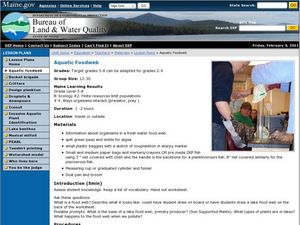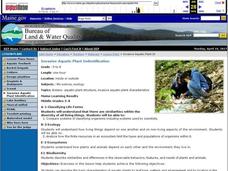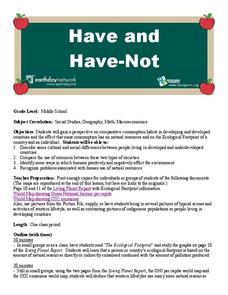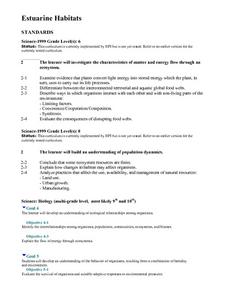Curated OER
Drought, nomads and the price of peanuts
Students read two short text items, which describe different approaches to agriculture. They describe the likely advantages and disadvantages of each approach for farmers, commercial peanut buyers, the government, nomadic herdsman and...
Curated OER
"Oh Deer!"
Students play a game where half of them are deer and the others are components of habitat: food, water, shelter and space. They signify their needs by hand gestures and take what they need to their side of the game. They discuss real...
Curated OER
Radical Raptors
Students study the lifestyles and habitats of raptors that live in Minnesota. They play games associated with their study.
Curated OER
Information Fluency Unit
Fourth graders, after defining the task and searching for some creative strategies, role play being a Park Ranger who tries to save Big Bend from being removed from the National Park system in Texas. They support the keeping of Big Bend...
Curated OER
Flipbook Succession
Students review succession charts for their native area before going to an outside site to view the changes. At the site, they follow the transect line and observe the changes in the plant life. They draw the changes on note cards that...
Curated OER
Fish Parasite Survey
Students count nematodes, cestodes and crustaceans on approximately one-hundred and fifty fish. They fill out autopsy reports for external and internal parasites then complete and discuss guide questions to make inferences about parasite...
Curated OER
Fish Parasite Survey
Students survey and dissect as many fish as possible. They count nematodes, cestodes and crustaceans on the fish, fill out autopsy reports, and transfer data to a chalkboard data table. Students graph the results of the entire class...
Curated OER
What Structures and Behaviours Can Be Observed in Vinegar Eels?
Students view vinegar eels under a microscope at different magnifications. They use a DigiScope with the camera attachment in place of the eyepiece. Students count the number of thrashing movements in 10 seconds. They repeat this three...
Curated OER
Water and Ice
Students observe what happens to water as it goes from a solid to a liquid. In this exploratory lesson plan students gain an understanding for the water cycle while working in groups observing what happens to water as it changes state.
Curated OER
What Makes you Hot?
Learners manipulate different variables in a model and make inferences about the temperature on Earth. In this heat lesson students calculate the blackbody radiation of an object at a certain temperature.
Curated OER
Flowering Phenology: How Do Plants Know When to Flower?
Students study the process of plant reproduction and the biotic and abiotic factors that affect flowering phenology. In this plant reproduction lesson, students describe the interaction of environmental factors as it relates to...
Curated OER
What's in Our Woods?
Students observe their local forest and document the change that occurs over the school year. For this forestry lesson, students utilize a GPS to mark a certain area of the woods as their study area for the remainder of the year....
Curated OER
Finding the Basal Area of a Forest Plot to Determine Stocking Levels
Learners use graphs and plots to measure the basal area and stocking levels. In this graphing instructional activity students work in the field the use their data to help them complete a lab activity.
Curated OER
Rice Straw
Third graders read about rice farmers and their left over straw and then draw pictures that show how they help migrating birds. In this rice straw lesson plan, 3rd graders read about how the rice farmers use their straw to help the birds...
Curated OER
Aquatic Foodweb
Learners explore what a food web is. In this science lesson, students examine how nutrients and other pollutants enter a lake and play a food web game whereby learners pretend they are either zooplankton, planktivore, piscivore, or...
Curated OER
Invasive Aquatic Plant Identification
Students observe aquatic plants and animals and identify their systems. In this plants and animals lesson plan, students compare systems of organisms and orally express how plants and animals rely on each other.
Curated OER
Environmental Risk Management
Middle schoolers investigate the concepts related to managing the environment. They conduct research using a variety of resources. Students cite examples of different organisms that have been targeted to become endangered. They answer...
Curated OER
Survival Of The Fittest
Seventh graders examine the concept of an ecosystem and how there is a variety of representations of life that exist there. They look at the equilibrium that is reached in stable communities and how the variable of change in...
Curated OER
A Living Watershed
Students, through this series of lessons, use local resources, speakers, print and video materials, as well as standard text materials to study the ecosystem of the local watershed.
Curated OER
Environment: The Haves and the Have Nots
Students examine consumption habits in developed and developing countries and determine their effects on natural resources. In groups, they assess graphs on the Living Planet Report and observe the connection between consumption and...
Curated OER
Estuarine Habitats
Sixth graders study the important habitats, flora, fauna, and physical factors of coastal habitats. They compare the aquatic habitats to terrestrial habitats by researching and completing tables with the information.
Curated OER
Give Me Some Air!
Third graders examine how trees produce oxygen. They examine satellite images of the reservation they examining and interpret the number of trees on the land. They determine how natural resources should be used wisely.
Curated OER
Planet of Plenty
Students examine a small piece of land to determine the diversity of life on Earth. They role play as visitors from outer space seeing life on Earth for the first time. They measure and observe their plots while working in small groups....
Curated OER
Wolf Pack in a Bottle
Young scholars participate in an activity of a mock electrophoresis using paper chromatography to study DNA and genetic restriction mapping.
Other popular searches
- Human Population Ecology
- Population Ecology Lab
- Community Ecology Population
- Biology Population Ecology
- Plant Population Ecology
- Population Ecology Plants
- Population Ecology Webquest
- Population Ecology Bacteria
- Population Ecology Web Quest
- Uk Population Ecology
- Population Ecology Graphing
- Census Population Ecology

























